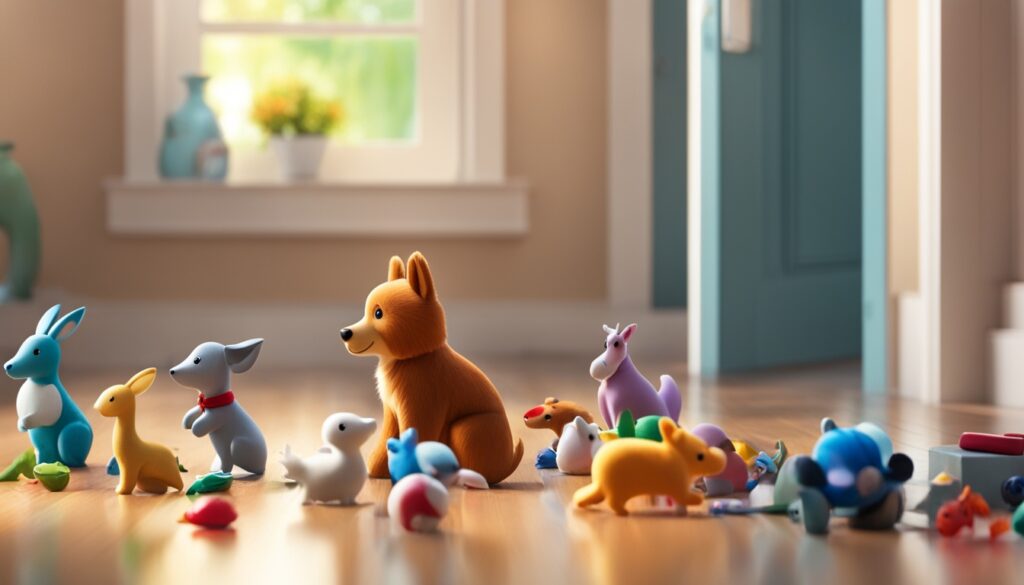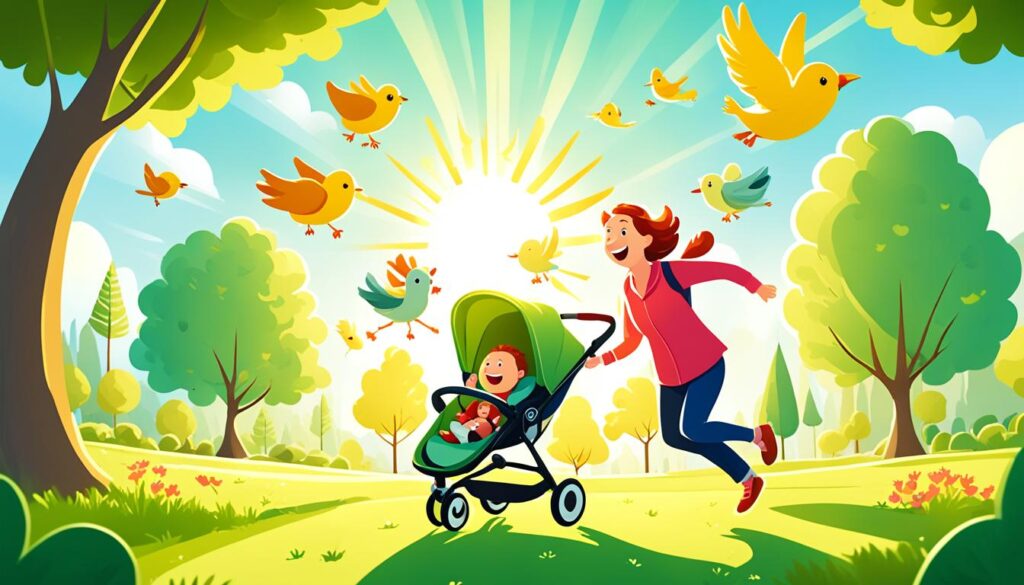Tearful, tantrum-filled goodbyes are common in a child’s early years. Around the first birthday, many kids feel separation anxiety. They get upset when a parent or other caregiver leaves them with someone else. This feeling is normal and can be tough for both you and your child.
Understanding what your child feels and having strategies can help you both. It makes getting through this phase easier.
Separation anxiety is a natural part of a baby’s growth and their bond with caregivers. By learning to handle this stage, you can help your child feel secure and confident. They’ll learn to be okay even when you’re not there.
Table of Contents
ToggleUnderstanding Separation Anxiety in Infants
As your little one grows, they start to understand the world better. They learn that things and people are still there even when they can’t see them. Around 4 to 7 months, your baby might start feeling separation anxiety. This is a normal part of their emotional growth.
What is Separation Anxiety?
Separation anxiety is when your baby feels scared or upset when you leave their sight. It shows they are getting more attached to you and worry about when you’ll come back. Since they don’t get time, they might feel worried and scared about your departure.
When Does It Develop?
Separation anxiety usually starts between 8 months and 1 year old. This is when they become more independent but still need you a lot. It’s a key time for them to learn about the world and keep feeling safe with their parents or guardians.
Knowing when separation anxiety happens can help you support your baby during this change. By creating a caring space and using ways to calm them, you can help your baby feel secure as they grow.
Signs and Symptoms of Separation Anxiety in Babies
As a parent, it’s key to know the signs of separation anxiety in your baby. This stage is common for infants. Understanding these signs helps you support your baby better.
One key sign is when your baby cries or feels distressed when you leave. They might cling to you, not wanting to be held by anyone else. They could also have trouble sleeping or wake up at night, looking for a parent or someone they know.
The way a baby reacts to being separated can depend on their personality and daily routine. More sensitive or anxious babies might feel separation anxiety more strongly. Being hungry, tired, or sick can make them feel more scared and need you more.
Knowing when your baby feels separation anxiety lets you help them through it. With patience, consistency, and love, your baby will get better at handling it. They’ll become more independent and confident over time.
Factors Affecting Separation Anxiety
Separation anxiety in babies can be affected by their temperament and routine. Babies who meet caregivers other than their parents early on find it easier to handle when parents leave. But, if a baby is tired, hungry, or sick, they might find it harder.
Temperament and Routine
A baby’s temperament greatly affects their separation anxiety. Some babies are more sensitive and feel more distress when parents leave. Others are more easygoing and adapt better. Also, a baby’s routine can change how they feel about being separated.
Babies with a consistent schedule handle separations better than those with unpredictable routines.
Hunger, Fatigue, and Illness
Hunger, fatigue, and illness can make separation anxiety worse in babies. When a baby is hungry, tired, or sick, they find it harder to cope with a parent’s departure. They need the comfort and security of their caregivers more during these times.

Understanding what affects a baby’s separation anxiety helps parents support their child better. This way, parents can help their child go through this stage with more ease and confidence.
Preparing Your Baby for Separation
As a parent, you’re key in helping your baby deal with separation anxiety. Start by preparing babies for separation in your daily life. Use practicing separations and creating goodbye rituals to make things easier for your baby.
Playing Peekaboo and Practicing Separations
Peekaboo is great for teaching your baby about object permanence. It shows them you’ll always come back, even if they can’t see you. You can also use a favorite toy to show them about being apart and coming back.
Start with short times apart and slowly make them longer. This helps your baby get used to you being away. Begin with just stepping out of the room and then increase the time as they feel more comfortable.
Establishing a Goodbye Ritual
A consistent goodbye routine can make your baby feel secure. It could be singing a song, giving a hug, or doing a special handshake. This way, your baby knows you’ll return, which helps them feel better when you’re apart.
Remember, every baby is different. Try various methods to see what works best for your baby. With patience and consistency, you can help your baby handle separation better.
Check out this link for more tips on preparing your baby for separation.
Handling Separation Anxiety During Departures
Managing separation anxiety during departures can be tough, but it’s doable with the right steps. It’s important to stay calm and consistent when leaving your child. Your feelings can affect theirs.
Staying Calm and Consistent
When it’s time to leave, keep a calm face. Don’t show any worry or hesitation, as it can make your baby more anxious. Instead, give a reassuring smile, a gentle hug, and a brief goodbye.
Being consistent is key. Always follow the same routine when you leave, so your baby feels secure.
Avoiding Prolonged Goodbyes
Long goodbyes can make separation anxiety worse. Your baby might think you’re not ready to leave. So, aim for a quick, positive goodbye.
A simple hug, a kiss on the cheek, and a gentle reassurance that you’ll be back soon can help. Sneaking away without saying goodbye can cause more distress, as your child didn’t get to process the departure.
With patience and consistency, you can help your baby overcome separation anxiety during departures. By staying calm and keeping goodbyes brief, you give your little one the support and reassurance they need. This way, they can feel secure even when you’re not there.
Separation anxiety in babies
Separation anxiety in babies is a big deal. The reunion is just as important as the departure. Happy reunion rituals help strengthen the bond between you and your baby. They make your baby feel safe and secure after being apart.
One simple way to make reunions special is with a warm hug. This hug can instantly calm your baby and show them you’re there. Playing with a favorite toy together is another great way to bond.
Letting your baby lead the reunion is also a good idea. Some babies like a quiet hello, while others want to show you something new. Listening to what your baby wants makes reunions happier.
The main aim of these rituals is to ease separation anxiety and strengthen your bond. By doing this, your baby will feel safe, loved, and confident, even when you’re apart.

Coping Strategies for Separation Anxiety
When your little one feels separation anxiety, it can be tough. But, there are ways to make it easier for them and for you too.
Using Transitional Objects
One good idea is to give your child a transitional object. This could be a favorite toy or a soft blanket. These items can be a comfort and help your child feel safe when you’re apart.
Checking In During the Day
Also, checking in with your child during the day can be helpful. It makes you feel better and helps you stay calm when you leave. A quick call or video chat can make a big difference in easing separation anxiety.
Using these strategies every day can make things easier for your baby. With time and patience, they’ll get better at handling being apart from you. Remember, they will learn to be more independent.
Separation Anxiety at Night
As the sun sets and bedtime comes near, separation anxiety can grow for babies. A steady bedtime routine can make this easier and get your baby ready for being apart. Activities like bath, books, and a special goodnight ritual tell your baby it’s time to sleep.
Establishing a Bedtime Routine
Being consistent with bedtime activities is important. Always do the same soothing things every night. This makes your baby feel safe and know what to expect. It helps lessen separation anxiety at night.
Using Recorded Voices and Sounds to Soothe
Along with a calming bedtime routine, recorded voices and sounds can offer comfort when you’re not there. Record yourself reading stories or singing lullabies. Then, play these for your baby when they feel anxious or alone. These familiar sounds can calm and reassure your baby.
With a steady bedtime routine and soothing sounds, you can help your baby deal with separation anxiety at night. Be patient and caring, and you’ll make sure both you and your baby get a good night’s sleep.
Conclusion
Managing separation anxiety in babies is a delicate process. It needs patience, consistency, and understanding your child’s needs. By supporting your child’s development and strengthening the parent-child bond, you can get through this tough time with empathy and skill. Remember, managing separation anxiety is key to your baby’s growth. It helps them build trust, resilience, and learn to soothe themselves.
This phase will pass, and your child will become more secure and confident. Keep trying the strategies from this guide, adjusting them for your situation and your baby’s unique nature. With time and effort, you’ll see a strong, secure bond grow. This bond will be the base for your child’s future relationships and well-being.
Use this chance to get closer to your little one. By managing separation anxiety, you’re not just helping your child grow. You’re also strengthening the parent-child bond that will last long after this hard time is over.
FAQ
What is separation anxiety in babies?
Separation anxiety is when babies get upset when a parent or caregiver leaves them with someone else. It’s a normal part of growing up.
When does separation anxiety typically develop in infants?
Babies usually start feeling separation anxiety between 8 months and 1 year old. They become more independent but still worry about being apart from their parents.
What are common signs of separation anxiety in babies?
Babies with separation anxiety might cry when a parent leaves, cling in new places, cry at night, or have trouble sleeping without a caregiver nearby.
How do factors like temperament, routine, and illness affect separation anxiety?
Babies who meet other caregivers early on find it easier to handle being apart. But being tired, hungry, or sick makes it harder. A baby’s personality and daily routine also play a role in how they feel about being separated.
What are some strategies to help ease separation anxiety in babies?
To ease separation anxiety, parents can play peekaboo to show they’ll always come back. Sending stuffed animals on “adventures” and reuniting them with the baby helps too. Short visits with a trusted caregiver and a consistent goodbye ritual, like singing a song or giving a hug, can also help.
How can parents remain calm and consistent during separations?
Parents should stay calm and consistent when leaving their child. Showing too much emotion can make the child more anxious. Quick goodbyes with a hug and reassurance that you’ll return help ease the separation. Sneaking away can cause more distress, as the child didn’t get to process the departure.
How can happy reunion rituals help with separation anxiety?
Happy reunion rituals, like hugging, playing, or following the child’s cues, strengthen the parent-child bond. They remind the child that being apart is sad but coming back is great.
How can transitional objects and checking in during the day help with separation anxiety?
Giving a comfort item, like a stuffed animal or blanket, can soothe a child during separations. Checking in on the child during the day provides reassurance, reduces guilt, and helps parents stay calm for the next goodbye.
How can parents manage separation anxiety at bedtime?
A consistent bedtime routine, like bath, books, and goodnight rituals, prepares the baby for being apart. Recording yourself reading or singing can also comfort the child when they’re alone or scared, offering a familiar presence even when you’re not there.
Source Links
About The Author

Medically reviewed by Dr. Chandril Chugh, MD, DM (Neurology)
Board-Certified Neurologist
Dr. Chandril Chugh is a U.S.-trained, board-certified neurologist with expertise in diagnosing and managing neurological disorders, including migraines, epilepsy, Parkinson’s disease, and movement disorders. His clinical focus includes evidence-based neurological care and patient education.
All content is reviewed for medical accuracy and aligned with current neurological guidelines.




